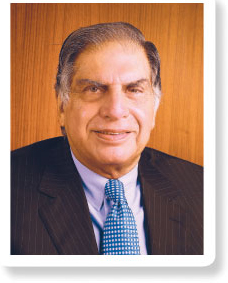
|
TATA STEEL WILL CONTINUE
TO BE COMMITTED TO
BE AMONGST THE MOST
COST-EFFICIENT STEEL
COMPANIES IN THE WORLD,
WHICH ARTICIPATES IN
THE DEVELOPMENT OF THE
COUNTRIES WHERE IT IS PRESENT, WHILE MEETING
ITS SOCIAL RESPONSIBILITY
TO ITS STAKEHOLDERS AND
THE COMMUNITIES WHICH
IT SERVES. |
|
|
Dear Shareholder,
During the year, the world continued on a path to regain economic stability
as it emerged from the global meltdown of 2008. While the US, the UK and
Western Europe experienced modest recoveries, China, India and other Asian
countries, as also certain countries in Latin America, continued to register
high levels of growth and continued to be centres of significant economic
activity. Inflation has, however, now emerged as the new global economic
challenge, driven by a substantial rise in the prices of almost all commodities,
mineral resources and energy, impacting almost all industrial sectors.
The global steel industry continued to face an unprecedented increase
in the price of iron ore and coking coal, accentuated by short-term supply
disruptions. These have created pressures on the viability of the steel industry
and consequently the competitiveness of the user industries. China continued
to be the largest national steel producer and largest domestic consumer of
steel. The steel demand in Western Europe and the UK has remained more
or less stagnant, with intense competition from steel producers in Eastern
Europe utilising lower cost inputs. Asian countries, including India, on the
other hand, continued to enjoy robust demand from several sectors resulting
in increased volumes and a richer product mix.
TATA STEEL
Europe
Tata Steel Europe’s operations have had to compete in the high-cost
marketplace where demand has been somewhat stagnant. The Company has
restructured its operations in several areas in order to be more competitive.
During the year it sold the unremunerative steel slab business as a going concern to an Asian steel maker. It has initiated steps to restructure and rationalise the UK long products manufacturing facilities with a view to make them profitable. The Company is also making long-overdue capital investments to upgrade and modernise some of the older, less efficient facilities as well as securing sources of coal and iron ore overseas, to achieve partial raw material security in the coming years.
India and South East Asia Tata Steel’s operations in India and Asia continued to be driven by the buoyancy in the markets in India and South East Asia where growth rates have continued to be high and demand for consumer products, automobiles and construction have been very promising. The expansion project at Jamshedpur, which will take the Steel Work’s capacity to 9.7 million tonnes, will contribute significantly to the volume and product mix of Tata Steel when these new facilities come on line in early 2012. Construction is also underway on the new 6 million tonnes capacity greenfield project in Kalinganagar, Odisha.
The Company has always given great importance to its control of the iron ore and coal which it consumes. It continues to actively explore opportunities for growth in India and other parts of Asia, which the Company believes will continue to be an area of economic growth.
BUSINESS OUTLOOK During the year under review, the Indian economy has performed well with very attractive growth rates reflecting strong consumer demand for almost all goods and services. The years ahead could, however, be challenging as the government endeavors to curb inflationary growth. Energy costs, reflecting higher prices of crude oil and gas as well as the shortfall in the availability of gas and electrical power will in themselves have a devastating impact on the country’s competitiveness and its ability to sustain the high growth rates it has enjoyed. Fiscal policies to control inflation will affect access to credit and could slow down investment levels as also consumer demand. The most significant impact will however be from the slowdown in major infrastructure projects in the areas of road construction, mass transit systems, power generation and investments in primary industries, where financial closure, right-of-way permissions and land acquisition could present major delays. These would have a major impact on job creation and the demand for goods and services, resulting in a substantially lower level of economic activity in the country compared to past years.
Further, state and private enterprises have been investing in establishing additional capacity to cope with the rising demand for goods and services. The anti-inflationary induced slowdown of economic growth in India, coupled with the possible plateauing of growth in China, the enormous financial burden on the Japanese economy following the devastating natural disaster and its after effects, could possibly slow down the Asian “economic engine” which has become such an economic game changer over
the past decade.
In Europe, the high debt and economic unsustainability of some of the southern European countries will most likely impose a significant strain on the financial structure of the European Union. Also, the increased political unrest in some of the countries in the Middle East, if escalated, will contribute to the political and economic instability in the region, (or the world),
in the
years ahead.
Good fiscal and economic management will therefore be needed to stimulate economic growth while at the same time curbing inflationary forces. There will need to be measures in place to control speculation and exploitation resulting in runaway prices of commodities and mineral resources which cascade through the entire value chain.
In the years ahead, steel will continue to be an essential building block of national development. Tata Steel will continue to be committed to be amongst the most cost-efficient steel companies in the world, which participates in the development of the countries where it is present while meeting its social responsibility to its stakeholders and the communities which it serves. |